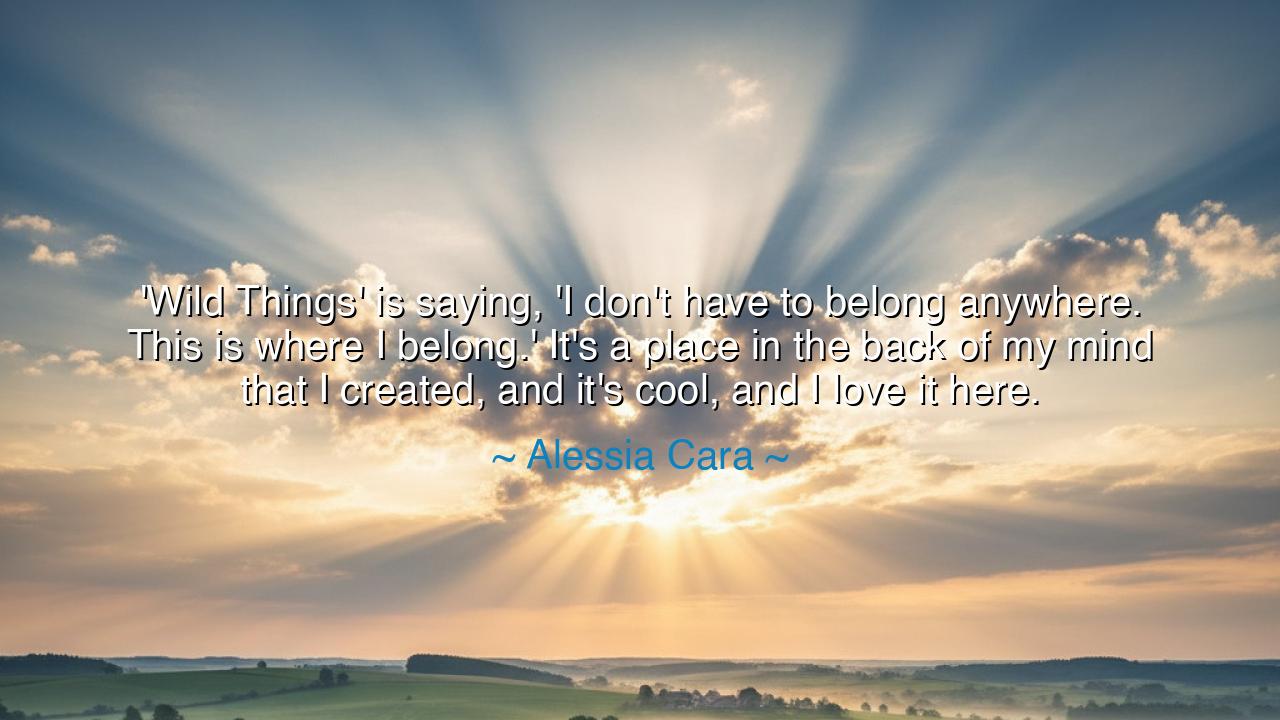
'Wild Things' is saying, 'I don't have to belong anywhere. This
'Wild Things' is saying, 'I don't have to belong anywhere. This is where I belong.' It's a place in the back of my mind that I created, and it's cool, and I love it here.






"'Wild Things' is saying, 'I don't have to belong anywhere. This is where I belong.' It's a place in the back of my mind that I created, and it's cool, and I love it here." With these words, Alessia Cara speaks to the universal longing for self-discovery and the power of creating one's own sanctuary within the mind. Her reflection touches on the idea of belonging, not in the external world, but in the inner world—a place where one can be fully themselves, unbound by the expectations or judgments of others. It is a place of freedom and acceptance, a refuge where authenticity reigns. In this sanctuary, we are free to belong to ourselves, to embrace the wild, unrestrained parts of our nature.
The ancients, too, understood the need to create space within, a sacred realm where the soul could find peace and truth. The Greeks spoke of the inner self and the universe within, urging their people to seek wisdom through self-reflection. Socrates famously declared that "the unexamined life is not worth living," encouraging individuals to explore the depths of their own minds, where true understanding and belonging could be found. In the teachings of the Stoics, such as Marcus Aurelius, there was a recognition that peace and contentment did not come from external circumstances, but from within. In the inner realm, we could cultivate a life of virtue, strength, and self-mastery, a place where we could be free from the chaos of the external world.
Alessia Cara’s words invite us to realize that belonging does not always require a physical space or a connection to others; sometimes, the most important place to belong is within ourselves. The wild things she refers to are the untamed aspects of our own nature—the parts of us that may not fit neatly into societal norms or expectations. Yet these parts, when embraced, form the foundation of a life well-lived. In ancient myth, the figure of the wild hero was celebrated—not because they fit into the rigid molds of society, but because they dared to follow their own path. Take, for example, the myth of Heracles, whose twelve labors were not just feats of strength but also of willpower, daring to challenge the forces that sought to limit him and finding within himself a place of unshakable resolve.
In this light, Cara’s creation of a mental space where she belongs is not simply a retreat, but a reclamation of self. She has created her own space in a world that often demands conformity, and in doing so, she has found freedom. This is the kind of space that the great sages of the past urged their followers to build—not just a physical place of retreat, but a mental one, where stillness and clarity could emerge. Buddha, in his quest for enlightenment, retreated into the wilderness not just to escape the world, but to return to the truth of his own nature, to silence the external noise and hear the whispers of his own heart. In this way, the sanctuary of the mind is not an escape from the world, but a place of renewal and power that allows us to engage with the world in a more profound and authentic way.
Consider the example of Vincent van Gogh, the artist who struggled with mental turmoil but found solace in his art. The painting of his own inner world—the wild and chaotic brushstrokes—became his way of belonging, his creation of a world in which he could express his truth. Van Gogh, like Cara, was not seeking to fit into any prescribed mold; instead, he created a space that allowed him to channel his pain and passion into something meaningful. Through his art, he formed his own sanctuary—a place where he could truly belong, even when the external world did not understand him. His legacy, shaped by this internal creation, has endured far beyond the confines of his lifetime.
The lesson here is profound: true belonging does not come from external validation or fitting into the expectations of others; it comes from creating a space within where you can truly be yourself. In a world that often encourages conformity, we must recognize the power of the wild things—the untamed, unfiltered parts of ourselves that may not fit into conventional spaces. Create your own sanctuary, as Cara suggests, a space where your truth, your freedom, and your uniqueness are not only accepted but celebrated. When we stop seeking approval from the world and instead cultivate our own inner peace, we become unstoppable forces of authenticity and strength.
In your own life, remember this: the wildness of the mind is not something to be tamed but embraced. Build your inner sanctuary, a place where you can be unapologetically you, where your ideas, dreams, and fears can coexist without judgment. In doing so, you will not only find belonging, but you will also unlock the power to transform your external world. Live with the knowledge that, just as Alessia Cara has created a space of freedom and authenticity, so too can you craft a world within where you belong—completely and entirely. The wild things are not something to fear, but something to cherish, for they are the parts of us that hold the greatest potential for growth, creativity, and joy.






AAdministratorAdministrator
Welcome, honored guests. Please leave a comment, we will respond soon